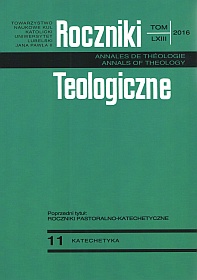Multiculturalism versus Identity
Abstract
In the discussed issue that concerns the relations between multiculturalism and identity, after showing the dimensions, ideology and the practical side of cultural pluralism, identity is presented (with religion being one of its important elements) as a great value for a society, especially one living in the European environment. And these reflections, supported with the experiences that have been gained, especially from France, Belgium and Germany, lead to stating that cultural pluralism is a certain value, but some definite requirements are set to it, especially ones that are concerned with its ideology. This cannot be dominating monism or hybrid monism. Mixing cultures is also unacceptable. Moreover, some communities, as e.g. Muslims, are not able to integrate with the society that has Christian values. They form closed groups that are not subjected to any control by the forces of law, which favors various sorts of crime. And this state of things, according to the rule “pars pro toto”, is the cause why the whole specific community is held responsible, and the initially positive attitude towards it is changed into isolating it. Hence – since the solutions that have been applied until now do not work, they should not be kept to, but new ones should be looked for, ones that do not destroy the identity of the local communities.
References
Alport G. W., Osobowość i religia, Warszawa 1988.
Babiński G., Religia i tożsamość narodowa – zmieniające się relacje, w: Religia i kultura w glo¬ba¬li¬za¬cyjnym świecie, red. M. Kempny, G. Woroniecka, Kraków1999, s. 197-211.
Bagrowicz J.,Konfesyjny czy ogólnokulturowy model nauczania religijnego młodzieży?, „Kwar¬tal¬¬nik Pedagogiczny” 2(1999), s. 69-85.
Borowik T., Doktor T., Pluralizm religijny i moralny w Polsce. Raport z badań, Kraków 2001.
Bronk A., Religia, w: Religia. Encyklopedia PWN, t. VIII, red. T. Gadacz, B. Milerski, Warszawa 2003, s. 393-403.
Bronk A., Zrozumieć świat współczesny, Lublin 1998.
Budzik S., Kijas Z. (red.), Uniwersalizm chrześcijaństwa a pluralizm religII, Tarnów 2000.
Bukowski K., Religie świata wobec chrześcijaństwa, Poznań 1988.
Człowiek w kulturze, „Kwartalnik Filozoficzno-kulturalny”, 1996, nr 8.
Gęsiak L., Wielokulturowość. Rola religii w dynamice zjawiska, Kraków 2007.
Geortz C., Religia jako system kulturowy, w: Racjonalność i styl myślenia, red. E. Mokrzycki, War¬szawa 1992, s. 498-555.
Góźdź K., Teologia człowieka. Z najnowszej antropologii niemieckiej, Lu¬blin: Wydawnictwo KUL 2006 (Człowiek jako istota kulturowa, s. 434-482).
Halik T., Religia i globalizacja, „Znak” 54(2003), nr 4, s. 12-21.
Jenkins F., Chrześcijaństwo przyszłości, tł. pol. S. Grodź; Słowo wstępne A. Bronk, Warszawa 2009.
Kondrat K., Filozofia analityczna wobec pluralizmu religijnego, Białystok 2000.
König K., Międzyreligijna, międzykulturowa i globalna („jeden świat”) pedagogika religII, „Keryks” II (3003), nr 1, s. 262-267.
Mariański J., Religia i Kościół w społeczeństwie pluralistycznym, Kraków 1993.
Misiaszek K., „Verbum Domini” zaproszeniem do wychowania inkulturowego w: Studia Kateche¬tycz¬ne, t. VIII: Kerygma–Biblia–Katecheza, red. R. Czekalski, Warszawa 2012, s. 147-156.
Mrozek A., Koran a kultura arabska, Warszawa 1967.
Nadolski B., Kulturotwórczy wymiar chrześcijańskiego świętowania, „Liturgia Sacra” 13(2007), nr 1(29), s. 35-45.
Religia i kultura w globalizacyjnym świecie, red. M. Kempny, G. Woroniecka, Kraków 1999.
Rusecki M. i in. (red.), Chrześcijaństwo jutra. Materiały II Międzynarodowego Kongresu Teo¬logii Fundamentalnej, Lublin, 18-21 września 2001, Lublin 2001.
Urban J., Dialog międzyreligijny w posoborowych dokumentach Kościoła, Opole 1999.
Skorowski H., Człowiek, Kultura, Świat, Warszawa 2002.
Węcławski T., Wspólny świat religII, Kraków 1995.
Wolanin A., Dialog chrześcijaństwa z innymi religiami, Kraków 1993.
Wolsza K., Kultura – kult – liturgia z perspektywy antropologiczno-filozoficznej, „Liturgia Sacra” 13(2007), nr 1(29), s. 5-18.
Zulehner P. M., Religia jako megatrend, „Keryks” II (2003), nr 1, s. 21-35.
Życiński J., Sacrum i kultura, Tarnów 1996.
Copyright (c) 2016 Roczniki Teologiczne

This work is licensed under a Creative Commons Attribution-NonCommercial-NoDerivatives 4.0 International License.





